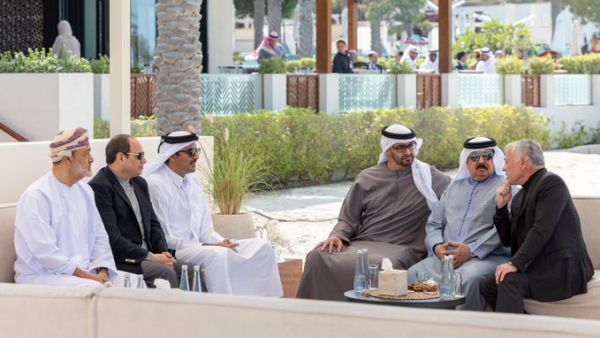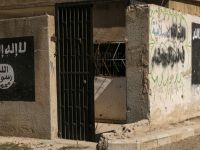ALBAWABA - Six Arab leaders met in Abu Dhabi on Wednesday amid rising global economic challenges, regional tension over a possible Israeli attack on Iranian targets and an escalation in the occupied West Bank caused by a new right-wing Israeli government, the most hardline in Israel's history.
Jordan’s King Abdullah II, Egyptian President Abdel-Fattah El-Sisi, Oman’s Sultan Haitham bin Tarik, Bahrain’s King Hamad bin Isa Al Khalifa, Qatar’s Emir Tamim bin Hamad Al Thani took part in the meeting hosted by United Arab Emirates President Mohamed bin Zayed. Regional powerhouse Saudi Arabia was absent.
وصول امير قطر الى ابوظبي للمشاركة في القمة الخليجية الاردنية المصرية. pic.twitter.com/GCiOtAZpot
— ZaidBenjamin زيد بنيامين (@ZaidBenjamin5) January 18, 2023
Jordan's Royal Court shared a photo showing King Abdullah sitting with the host and the other Arab leaders outdoors.
His Majesty King Abdullah II, Egypt President Abdel Fattah El Sisi, and Palestinian President Mahmoud Abbas hold a trilateral summit at Al Ittihadiya Presidential Palace in Cairo#Jordan #Egypt #Palestine ?????? pic.twitter.com/b1JRrzXUrk
— RHC (@RHCJO) January 17, 2023
The summit comes in the wake of the failure to renew crucial international talks with Iran on its nuclear program, which will potentially curb Tehran's nuclear ambitions, ultimately easing regional tension on Iran's military supremacy over the Peninsular Shield Force.
The group is the military arm of the Gulf Cooperation Council, which is headquartered in Riyadh, Saudi Arabia, and also includes Bahrain, Kuwait, Oman, Qatar and the United Arab Emirates. The force, formed in 1984 aims to shield GCC members of aggression.
أهلا وسهلا بكم في بلدكم الإمارات.. خصوصا أمير قطر وملك البحرين، نفرح ونتفاءل جدا لإجتماعكم في مكان واحد
— Nasser H. Al-Shaikh (@NAlShaikh) January 18, 2023
Welcome all in your country, the UAE.. especially the Emir of Qatar & the King of Bahrain. We’re filled with joy & optimism to see you meeting in one place pic.twitter.com/eTRBGt0M2Z
By the same Token, Israel is concerned that Iran's hardline Shiite Muslim clerics, who once called for its annihilation, may do good on their threat in the future, if they possessed a nuclear weapon.
Hardline Israeli Prime Minister Benjamin Netanyahu, who took office in late December, has threatened preemptive strikes at unspecified Iranian targets, most likely suspected sites where Iran is developing its nuclear program.
But Arab leaders have warned against the move, warning it may destabilize the region in the event of failure to revive the nuclear deal.
The Abu Dhabi summit follows an Israeli escalation in the West Bank under Netanyahu's Cabinet, which is widely seen as aiming to annex more Palestinian land and seeking to control holy shrines in Jerusalem, a divided city whose future was to be determined in Palestinian-Israeli negotiations, which stalled years ago. Netanyahu has repeatedly pledged that Jerusalem in its entirety will be the eternal, undivided capital of Israel.
Wednesday's summit meeting, entitled "Prosperity and Stability in the Region," sought to deepen cooperation between the leaders' countries in all areas that serve progress, prosperity and stability in the region through further joint action and cooperation and regional complementarity, the Bahrain News Agency reported.
It said the leaders discussed "relations, cooperation and coordination between their countries in all fields that fulfill the aspirations of their peoples for a future in which the region will enjoy further development, progress and prosperity."
They stressed the importance of adhering to the rules of good neighborliness and respecting the principle of non-interference in the internal affairs of the countries of the region, BNA said.
"They also reviewed regional and international issues and developments of shared interest as well as the political, security and economic challenges facing the region," BNA said. It did not elaborate, but noted that the leaders asserted the "importance of coordinating positions and strengthening joint Arab action in tackling the challenges in order to ensure building a more stable and prosperous future for all the peoples of the region."
Abdullah, along with Sisi and the U.A.E. leader have stepped their contacts in the past few months for closer economic cooperation to jointly confront global challenges. The three countries, along with Bahrain, are bound by a significant industrial partnership initiative agreed upon last July, which envisions multi-billion dollar investments in several key sectors.
The summit came a day after Abdullah and Sisi held a coordination meeting with Palestinian President Mahmoud Abbas in Cairo, the Jordan Times reported.








